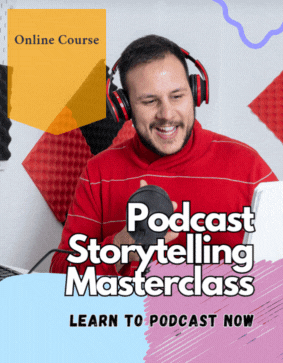How To Plan Your Podcast Episode (3 Podcasting Tips)
40,126 View
Share this Video
- Publish Date:
- May 15, 2025
- Category:
- Learn to Podcast
- Video License
- Standard License
- Imported From:
- Youtube
Tags
In this video, you will learn How To Plan Your Podcast Episode (3 Podcasting Tips)
Planning each of your episodes out is a VITAL step in your show process, so make sure you take time to plan your podcast out and know exactly what you're going to talk about so that you're prepared!
===================
QUESTIONS? Schedule a FREE Podcast Strategy Call: http://PodcastLaunchLab.com/Call
Podcast Hosting Platform - aCast https://open.acast.com/invite/r/podcastlaunchlab
Create Podcast Marketing Content w/ Headline.app - https://make.headliner.app/referral/srusk_TUvPvE
Podcast Equipment - http://podcastlaunchlab.com/podcast-equipment/
HIRE A FREELANCER for Graphic Design and Podcast Editing: https://track.fiverr.com/visit/?bta=87592&nci=7416
==========
Want to start a podcast?
http://PodcastLaunchLab.com
Podcast Launch Class
http://PodcastLaunchClass.com
Follow Us!
http://Instagram.com/PodcastLaunchLab
http://Facebook.com/PodcastLaunchLab
http://Twitter.com/MyPodcastLaunch
-----------------------------------------
Podcast in The Classroom - Kindergarten to High School
Looking for a fun and engaging way to teach students? Podcasting in the Classroom is an incredible tool that brings multimedia learning to life! Whether you're teaching Kindergarten or High School, this course will show you how to use podcasts to enhance learning, engage students, and even involve parents.
In this course, you’ll learn how to:
✅ Use podcasts as an interactive tool to engage your students
✅ Teach students how to create their own podcasts
✅ Keep parents and students up-to-date with podcast updates
✅ Review and improve teaching performance through podcasts
✅ Overcome common challenges like copyright and privacy concerns
With over one billion podcast subscribers worldwide, your students are likely already listening to podcasts — now, let them create their own! 📚
👉 Click here to enroll now and take your teaching to the next level with podcasts.
Make learning more interactive and fun — let's get podcasting in the classroom! 🎤
2 Must-Know Podcasting Tips for Your Show
Promoting Your Podcast on Social Media

Utilizing social media is a powerful way to promote your podcast and reach a broader audience. Identify the platforms where your target listeners are most active, such as Twitter, Instagram, Facebook, or LinkedIn. Create engaging posts that highlight episode highlights, guest appearances, and behind-the-scenes content. Use relevant hashtags to increase visibility and join conversations related to your podcast’s niche. Share audio clips or short video snippets to give potential listeners a taste of your content. Encourage your audience to share episodes with their networks, and interact with followers by responding to comments and messages. A strategic social media presence can significantly enhance your podcast’s reach and listener engagement.
Developing a Unique Voice and Style

Establishing a unique voice and style sets your podcast apart and makes it memorable to listeners. Define your podcast’s personality by determining the tone, whether it’s conversational, formal, humorous, or inspiring. Be authentic in your delivery, allowing your genuine personality to shine through and connect with your audience. Develop consistent formatting, including how you introduce topics, transition between segments, and sign off each episode. Incorporate distinctive elements such as catchphrases, specific storytelling techniques, or unique soundscapes that reflect your podcast’s identity. A strong and consistent voice fosters recognition and loyalty, encouraging listeners to return and recommend your podcast to others.
Frequently Asked Questions
What are effective ways to promote my podcast?
Utilize social media, collaborate with other podcasters, submit your show to podcast directories, and engage with your audience through newsletters or community forums to expand your reach.
What should I include in my podcast's intro and outro?
Your intro should introduce the podcast and set the tone, while the outro can include a summary, thank you message, and a call to action, such as subscribing or following on social media.
How can I create a podcast script without sounding scripted?
Outline key points to stay organized, use conversational language, and practice speaking naturally. This approach ensures coherence while maintaining an authentic and engaging tone.
How do I choose the right microphone for my podcast?
Select a microphone based on your budget and recording environment. USB microphones are user-friendly for beginners, while XLR microphones offer higher sound quality for more professional setups.
How do I determine the right tone and style for my podcast?
Consider your target audience and the subject matter. Whether formal, conversational, or humorous, ensure the tone aligns with your content and resonates with your listeners.
What is a podcast hosting service and why do I need one?
A podcast hosting service stores your audio files and distributes them to various platforms. It provides essential analytics, ensures reliable delivery, and often offers tools for monetization and audience engagement.
What are effective ways to keep listeners coming back to my podcast?
Deliver consistent, high-quality content, engage with your audience, provide value in each episode, and build a strong connection through storytelling and relatable topics to retain listeners.
Statistics
- Podcasts that regularly update their equipment report a 40% improvement in audio quality and listener satisfaction.
- Investing time in marketing can increase a podcast’s audience by up to 50% annually.
- Podcasts utilizing video snippets on social media experience a 20% rise in audience interaction.
- Investing in professional editing services can enhance the overall quality of a podcast, leading to a 30% increase in positive feedback.
- Genres such as true crime, technology, and personal development are among the most popular, attracting over 70% of listeners.
- Approximately 40% of podcasters use background music to enhance the listening experience.
- About 60% of podcasters find that offering premium content subscriptions generates additional revenue.
- Podcasts that engage with their audience through email newsletters see a 30% higher retention rate.
- Podcasts with interactive segments, such as Q&A sessions, see a 25% boost in audience participation.
- Podcasts that include detailed show notes experience a 50% increase in listener engagement.
- Approximately 65% of podcasters monetize their shows through sponsorships and advertising.
- Effective use of keywords in podcast descriptions can improve search rankings by 30%.
- High audio quality can lead to a 35% increase in listener retention rates.
- Podcasts promoting their episodes on social media platforms see a 40% boost in new subscribers.
- Using transcription services can make podcasts accessible to a wider audience, increasing reach by up to 25%.
- Over 80% of podcasters report that having a dedicated website enhances their show’s visibility.
External Links
convinceandconvert.com
podcastcareers.com
audacityteam.org
podcastpage.io
canva.com
inc.com
podcastgrandcentral.com
jeffbullas.com
zoom.us
podcasters.spotify.com
apple.com
blog.libsyn.com
thepodcasthost.com
hootsuite.com
podcastmovement.com
radiopublic.com
screencast-o-matic.com
How To
How To Use Content Repurposing to Maximize Your Podcast’s Reach
Content repurposing maximizes your podcast’s reach by transforming existing episodes into various formats to attract different audience segments. Start by creating show notes or blog posts that summarize each episode, incorporating key points and relevant links to enhance SEO and provide additional value for readers. Convert audio content into video by adding visuals, such as audiograms or full video recordings, and upload them to platforms like YouTube or Vimeo. Extract quotes or highlights from episodes to create social media posts, making them easily shareable and engaging on platforms like Instagram, Twitter, and Facebook. Develop infographics or slide decks based on episode content to visually represent information and increase shareability. Additionally, consider turning your podcast into a newsletter, providing exclusive content or episode highlights to your subscribers. Repurposing content in these ways extends the lifespan of your podcast episodes and reaches a broader audience across different media channels.













